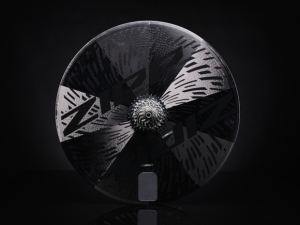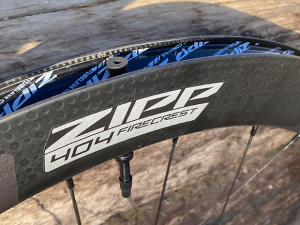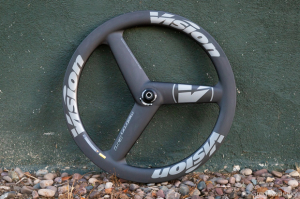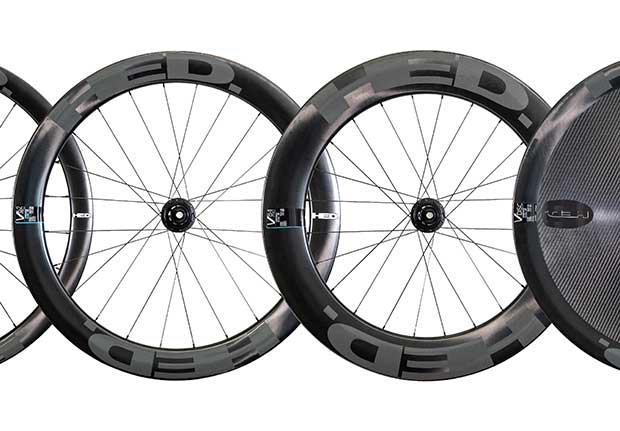
HED’s recent refresh of its Vanquish series of wheels honors a truth most people aren’t aware of and don’t acknowledge. This truth is: wheel users will choose a tire – and especially a tire width – without much thought of the wheel they own or will buy next. Tire width should drive decisions. For example, if you know you’re going to ride a 25c tire, or a 28c tire, that knowledge should inform the wheel you buy.
Why? Because wheel engineers design their wheels to work with a specific tire width. Why not own the wheels that match the tire you’re going to use anyway?
This is true whether the rims are hooked or hookless and the new Vanquish wheels – with hooked beads – were designed with an imperative in mind that’s pretty clever: tire agnosticism. “We wanted to improve handling, increase strength, and not be slower. We wanted to get the wheels even more agnostic to tire size – drag differences between 25 and 28mm tires are even less than they were on the previous generation, which dates back to 2017. This is especially true on V8.” This according to HED’s engineering team.
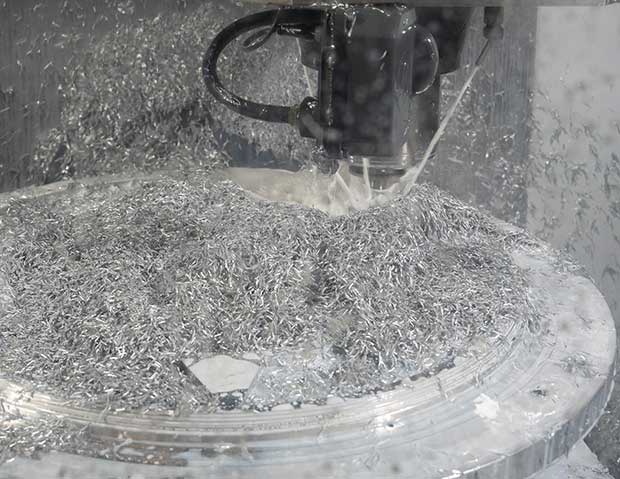
Increased wheel strength, tire agnosticism and handling are the imperatives that drove HED’s engineers. “The nose profile has changed to improve crosswind stability. This is readily verified in the wind tunnel charts around the 0° yaw angle. Each wheel exhibits consistent drag numbers around 0° yaw and drops off steadily giving the rider more time to react to changing wind conditions and gusts.”
A note on terminology. Vanquish is HED’s flagship product and like all its wheels are made in its Minnesota factory (above is a pic of a mold getting cut in the Twin Cities area headquarters). The Vanquish comes in 2 versions, the Vanquish and the Vanquish Pro. The Vanquish Pro wheelset sells for $2600 per pair, same price for any depth combo except the price goes up a bit if one of the wheels is a disc.
The Vanquish (not Pro) sells for $1,750 a pair, and this is the kind of value that makes HED a favorite among Slowtwitchers. The Vanquish (not Pro) has only a 45mm an 62mm front wheel option, whereas the Vanquish Pro front wheel includes the 84mm depth.
The Vanquish line includes depths of 45mm, 62mm, 84mm and disc. These are referred to as the V45, V62, V84 and VDisc, with the latter 2 only available in the Pro trim. The V45 and V62 in the Pro trim just have the word Pro as a suffix, as in, V45 Pro. The V84, which is only available in the Pro trim, is sometimes called by folks inside of HED the V8 because in the prior (2017) Vanquish update this depth was known as the V8.
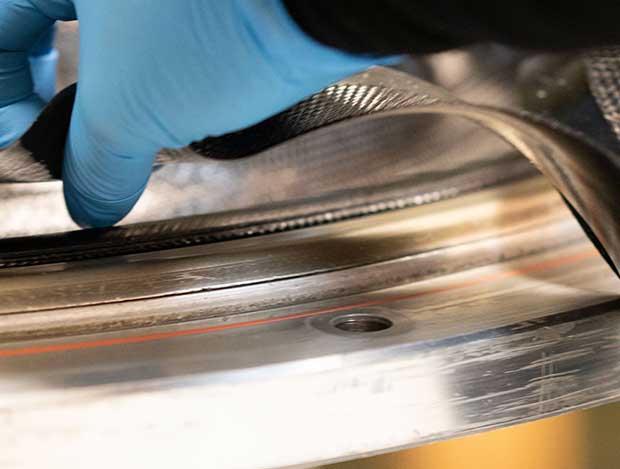
All these wheels are sold separately, so, if you want (say) a HED Jet 180 on the rear for your Kona race you buy that and whatever front you want, which might be a Vanquish or it might be a front Jet, which is a better value yet. Just, the Jet is a narrower rim so is more optimized for a 25c tire (more on this below).
The shape of the Vanquish and Vanquish Pro is the same. Aerodynamics are virtually the same. The difference between the wheels are weight and hubs. The Pro has a lighter carbon layup and lighter spokes. All Vanquishes use pawl-style hubs. The Vanquish hub is a 4-pawl hub with 27 teeth on the ratchet ring. The Pro has a 5-pawl driver body with 45 teeth on the ratchet ring. These differences sound bigger than they are. Engagement is a more urgent issue in mass start racing. Both hubs are fine for the triathlon use case. As to weight, using 62mm depth front and rear the difference between Vanquish and Vanquish Pro is 85 grams (1710g to 1625g for the pair).
These Vanquish wheels have pretty wide rims and HED has always been the industry driver on rim width going back 15 or so years. This company has a number of patents that control the shape of wheels with tires mounted and inflated, and wider rims are a critical part of that. (The patents are designed to keep HED at the leading edge – no pun intended – of aero function.) Internal rim width is 22.4mm throughout the line and this will likely add about 1.5mm of width to whatever the nominal tire size (a named 25mm tire will probably measure on average about 26.5mm when inflated on this rim). The external width of all the wheels 30.9mm. This Disc shares the same width specs as the deep rims is really the V62 built as a disc rather than a spoked wheel.
Getting back to tire agnosticism there’s a lot of lines crowding this graph but take a look:
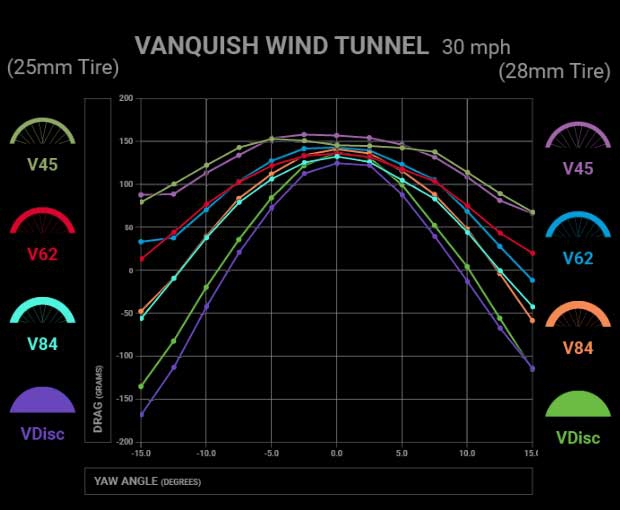
I think what you’ll see is that 25c and 28c tires are pretty close everywhere except when mounted on the disc. That’s the only point where you really see any space in aero performance between tire sizes and it’s pretty small. Because of this what you see for all the wheels other than the disc is that 28c is the recommended tire size: “Taking into account rolling resistance, cornering and descending grip, and metabolic cost of a rougher ride we think that 28 is the faster overall setup.”
“Slight advantage to 25 tire on a disc? In the wind tunnel, yes. In the wild? There’s going to be a thread about this,” says HED. “The wind tunnel does not measure cornering speed and confidence or metabolic cost of suspension losses. Keep in mind that the disc is run in clean air in the wind tunnel, but it is always in dirtier air on a bike. The differences will be smaller in the real world use case. We still recommend a 28 tire even on a disc.”
But a lot of this comes down to feel rather than numbers. “It is my experience that riding a wider tire improves handling in some wind conditions,” said Andy Tetmeyer, HED’s longtime shop foreman and wheel designer. “The front wheel jerks around less with even a 3mm wider tire. This is my anecdotal experience but in informs my recommendation to go with a 28 vs a 25.
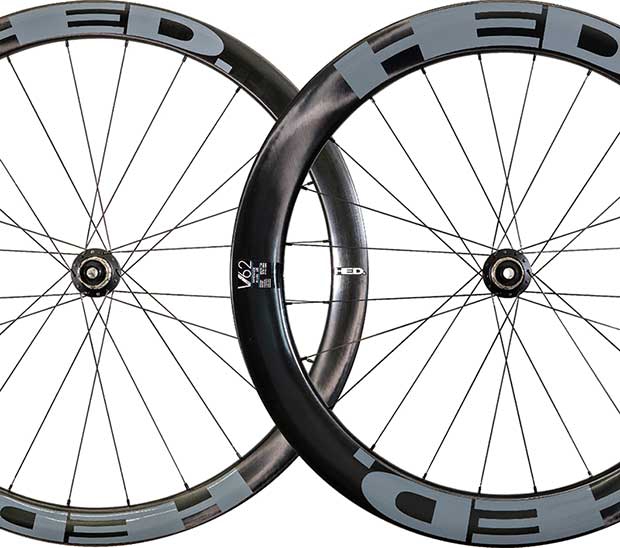
That said, what will HED’s athletes ride? This smaller but highly influential wheel maker has San Laidlow, Magnus Ditlev, Lionel Sanders an Leon Chevalier on its wheels. A notable non-HED athlete was also on this new Vanquish Disc: Bontrager does not make a disc wheel so Trek facilitated getting the V Disc ridden by Taylor Knibb when she won U.S. National TT champs and qualified for the U.S. Olympic Team in cycling (she’s going to Paris as both an Olympic cyclist and triathlete). Knibb rode Conti 5000 TTs in the race she just won, 28c on the rear disc (the Vanquish Disc I’m writing about here), and a 25c on the Bontrager front wheel.
I don’t yet know what tire widths these HED athletes are riding just now, but I’ll do some digging and report back, also on the wheels ridden by Rach McBride, Sara Perez, Suzie Cheetham, Michelle Vesterby, Haley Chura and India Lee. Gwen Jorgensen rides the new Vanquish line in 28c in dry conditions and 30c in the rain but, of course, that's in a mass start format.
The one thing I don’t have enough data on yet is how well tires bead up upon inflation, when used tubeless. If I had one question about the prior version of this wheel it’s that this was sometimes an issue in my experience. The shape of the well has been reworked in the new version and the idea is that any tire you want to ride should bead up easily. We’ve got wheels and various tires coming pursuant to testing just this, and we’ll report back on this as well.

